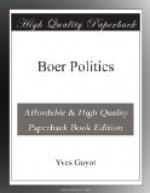Mr. Krueger’s closing words were:—
“I have nothing
to add, I shall submit the questions concerning the
Franchise to the Volksraad
as soon as I receive the reply that the
English Government accepts
my proposal of arbitration.”
On June 9th, the proposals relating to arbitration were formulated by Mr. Reitz, State Secretary to the Pretoria Government. He began by proving that he could put into people’s mouths words which had never been uttered by them. He declared that “at the Bloemfontein Conference the High Commissioner was personally favourable to the settlement by arbitration of all the differences between the two Governments.” Sir Alfred Milner had been careful not to go so far as this.
After this inaccurate preamble the following proposals were made by Mr. Reitz:—
(1) “In future, all questions arising between the two Governments, and relating to the interpretation of the London Convention to be submitted to a tribunal of arbitration, with the exception of questions of trifling importance.”
(2) “The tribunal to be composed of two arbitrators appointed respectively by each government, as for instance the Chief Justices of the South African Republic, Cape Colony or Natal. The power to be given to them of choosing as a third arbitrator, someone who should be a subject of neither of the disputing parties; the decision in all cases to rest with the majority.”
(3) “The instrument of submission to be considered in each case by the two governments, in order that both may have the right of reserving and excluding any points appearing to them too important to be submitted to arbitration.”
Sir Alfred Milner remarked that this project was “a mere skeleton proposal by which too many things were left undefined.” For instance, what did the words “trifling matters” mean? and what was meant by the third article, which gives to both Governments the right of excluding from arbitration points which may appear to them too important to be submitted to it?
Finally, the very composition of the tribunal was in contradiction to the reservations made by the English Government. The third arbitrator would be a foreigner, and with this third arbitrator would rest the decision.
[Footnote 22: Le Siecle, April 26th, 1900.]
2.—Mr. Chamberlain’s Conditions.
In his telegram of July 27th, however, Mr. Chamberlain did not reply by an absolute definite refusal. He rejected the composition of the tribunal; but he acknowledged that: “the interpretation of the convention in detail is not exempt from difficulties, putting aside the question of the interpretation of the preamble of the Convention of 1881, which regulates the articles substituted in the Convention of 1884.” And then Mr. Chamberlain invited Sir Alfred Milner to enquire of Mr. Krueger whether he would accept the exclusion of the Foreign element in the settlement of disputes, arising from the interpretation of the Convention of 1884:




